Meet some of the Oxfam staff involved in the tsunami relief operations and see the camps housing displaced people.
Matae settlement, Aceh, Indonesia
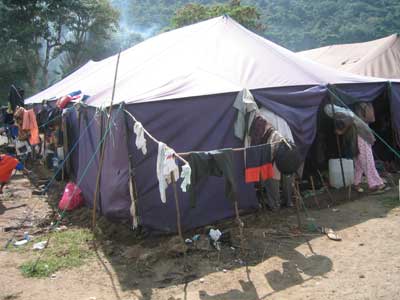 Matae settlement is located in Banda Aceh. Many of the displaced people in Matae are living in tents like this, housing up to 120 people. Some of the displaced people have expressed their desire to return to their former village. At present villagers have to walk for one whole day to get to the village that has been devastated by the tsunami. Villagers have been returning to bury bodies and collect debris- they want to clean the area so that they can return. Oxfam has agreed to provide the villagers with a boat once a week so that they can return to the village. Oxfam teams will carry out assessment work so that we can assist people in their journey home
Matae settlement is located in Banda Aceh. Many of the displaced people in Matae are living in tents like this, housing up to 120 people. Some of the displaced people have expressed their desire to return to their former village. At present villagers have to walk for one whole day to get to the village that has been devastated by the tsunami. Villagers have been returning to bury bodies and collect debris- they want to clean the area so that they can return. Oxfam has agreed to provide the villagers with a boat once a week so that they can return to the village. Oxfam teams will carry out assessment work so that we can assist people in their journey home
Credit: Lina Hoglun/Oxfam
Helen Meekings, Oxfam engineer, Aceh, Indonesia
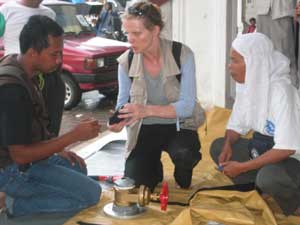 “I’ve been working in Aceh for three weeks now. I’m very glad I came here. It has been a huge challenge, but we are now starting to see the results of our efforts. Oxfam is providing clean water, setting up latrines and working to improve the lives of people living in temporarily settlements. As a team we have been working closely with the communities, in some settlements we have trained people on how to build latrines…We have also decided to pay a representative of the community to keep the latrines clean, this brings money to the community to kick start the local economy.”
“I’ve been working in Aceh for three weeks now. I’m very glad I came here. It has been a huge challenge, but we are now starting to see the results of our efforts. Oxfam is providing clean water, setting up latrines and working to improve the lives of people living in temporarily settlements. As a team we have been working closely with the communities, in some settlements we have trained people on how to build latrines…We have also decided to pay a representative of the community to keep the latrines clean, this brings money to the community to kick start the local economy.”
Credit: Lina Hoglun/Oxfam
Dawati Shadi Depi with her daughter. Aceh, Indonesia
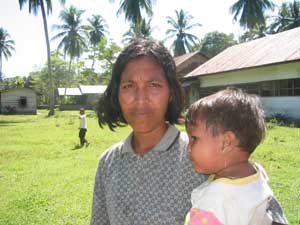 An Oxfam helicopter landed in Pante Kuyun, Aceh Jaya on January 20th. The village has a population of 1000 people and is also hosting 1500 displaced people that fled their destroyed villages around the West Coast. Oxfam supplied the displaced people with plastic sheets, jerry cans and mattresses. One resident of Pante Kujun told Oxfam her journey to the village: “I am Dawati Shahdi Depi, I’m 25 years old. My village was destroyed by the tsunami. To get here I walked for 3 days with my two kids. People from this village saw me in the mountain and brought me here, my kids where very tired and hungry. One of the villagers is letting me stay in his house. My kids and I only have the clothes that we are wearing. We only eat one portion of rice once a day. When I heard a helicopter above I ran to see what aid it was bringing. I’m glad for the mattresses, now we don’t need to sleep on the floor…but I also need underwear, clothes and money… I want to go back to my village.”
An Oxfam helicopter landed in Pante Kuyun, Aceh Jaya on January 20th. The village has a population of 1000 people and is also hosting 1500 displaced people that fled their destroyed villages around the West Coast. Oxfam supplied the displaced people with plastic sheets, jerry cans and mattresses. One resident of Pante Kujun told Oxfam her journey to the village: “I am Dawati Shahdi Depi, I’m 25 years old. My village was destroyed by the tsunami. To get here I walked for 3 days with my two kids. People from this village saw me in the mountain and brought me here, my kids where very tired and hungry. One of the villagers is letting me stay in his house. My kids and I only have the clothes that we are wearing. We only eat one portion of rice once a day. When I heard a helicopter above I ran to see what aid it was bringing. I’m glad for the mattresses, now we don’t need to sleep on the floor…but I also need underwear, clothes and money… I want to go back to my village.”
Credit: Lina Hoglun/Oxfam
Kristina Karavasini, Oxfam water and sanitation engineer, Aceh, Indonesia
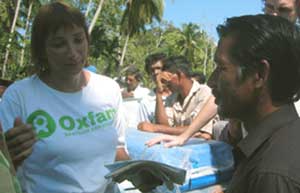 Most of the coastal areas that I have visited have wells polluted by mud and debris. We have undertaken well cleaning actives in a number of costal villages but have found that in many locations the tsunami has altered groundwater characteristics. Despite intensive cleaning activates, water from shallow wells is often brackish and unpleasant to drink.
Most of the coastal areas that I have visited have wells polluted by mud and debris. We have undertaken well cleaning actives in a number of costal villages but have found that in many locations the tsunami has altered groundwater characteristics. Despite intensive cleaning activates, water from shallow wells is often brackish and unpleasant to drink.
Our main concern in these areas is to provide water in sufficient quantity and to make it available to all those in need. Since people in Indonesia generally boil their drinking water, I`m less concerned about providing high quality water at this stage. In this respect Oxfam has been taking steps to ensure that vulnerable people have the means to boil their water by providing cooking sets and kerosene fuel.
In Banda Aceh and other urban areas such as Melabo, Oxfam is trucking in water to settlements, setting up temporary water facilities in the form of bladder tanks, and working with communities to provide acceptable solutions to meet their water and sanitation needs.
Credit: Lina Hoglun/Oxfam
Lina Holguin, Media and Advocacy officer Oxfam International
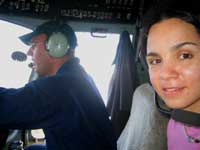 Lina Holguin, Media and Advocacy officer Oxfam International, flying to the west coast with the Oxfam team delivering aid to affected populations. ” Flying over the devastated area was shocking and left me speechless. The pilot pointed out former villages that were submerged in water. Large areas of agricultural land have been contaminated by seawater. I wondered how long it would take to rebuild these areas and restore some kind of normality to people’s lives. We eventually landed in Pante Kujun and distributed aid to those in need. It’s the money that ordinary people have donated to Oxfam that is making a real difference to people’s lives. I feel proud to be part of the Oxfam team who are working around the clock to assist the people of this region.”
Lina Holguin, Media and Advocacy officer Oxfam International, flying to the west coast with the Oxfam team delivering aid to affected populations. ” Flying over the devastated area was shocking and left me speechless. The pilot pointed out former villages that were submerged in water. Large areas of agricultural land have been contaminated by seawater. I wondered how long it would take to rebuild these areas and restore some kind of normality to people’s lives. We eventually landed in Pante Kujun and distributed aid to those in need. It’s the money that ordinary people have donated to Oxfam that is making a real difference to people’s lives. I feel proud to be part of the Oxfam team who are working around the clock to assist the people of this region.”
Credit: Lina Hoglun/Oxfam
Dayan, Oxfam translator, lives in Banda Aceh, Indonesia
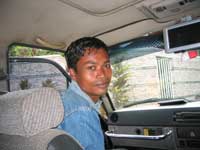 “The tsunami destroyed my house- but my family and I were lucky as we survived. Together with my wife and child we lived in Matae settlement for a few days after the tsunami with very little food or proper space to live. It was then that I decided that I couldn’t let my family live like this- so together with my wife and child we went to live in an extended family members house. Things are difficult as there are few jobs and nobody knows what the future holds. I’m glad that I have a job working with Oxfam because I feel that I am doing my bit to help my people and my community to re-build their lives after this disaster.”
“The tsunami destroyed my house- but my family and I were lucky as we survived. Together with my wife and child we lived in Matae settlement for a few days after the tsunami with very little food or proper space to live. It was then that I decided that I couldn’t let my family live like this- so together with my wife and child we went to live in an extended family members house. Things are difficult as there are few jobs and nobody knows what the future holds. I’m glad that I have a job working with Oxfam because I feel that I am doing my bit to help my people and my community to re-build their lives after this disaster.”
Credit: Lina Hoglun/Oxfam
Shaista Aziz, Oxfam media officer, Banda Aceh, Indonesia
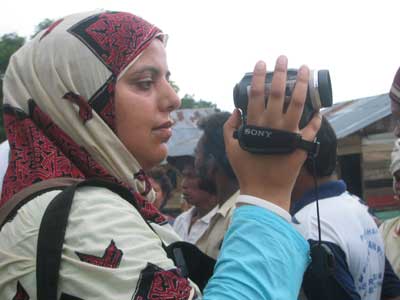 I`ve been in Aceh for almost three weeks, this is my first emergency working with Oxfam. I have been inspired by my colleagues and their dedication to their work, and have seen the difference that Oxfam is making to peoples lives in Banda Aceh. I’ve spoken to many local people who have lost everything, their stories have moved me as has their dignity and resilience. My job is to help tell the story of Oxfam’s response to this emergency and to try and empower the communities that I’ve been interacting with by creating the space in the media to tell their stories- ensuring that their voices are heard.”
I`ve been in Aceh for almost three weeks, this is my first emergency working with Oxfam. I have been inspired by my colleagues and their dedication to their work, and have seen the difference that Oxfam is making to peoples lives in Banda Aceh. I’ve spoken to many local people who have lost everything, their stories have moved me as has their dignity and resilience. My job is to help tell the story of Oxfam’s response to this emergency and to try and empower the communities that I’ve been interacting with by creating the space in the media to tell their stories- ensuring that their voices are heard.”
Credit: Lina Hoglun/Oxfam
Ruaida Abrahim, community leader, Aceh, Indonesia
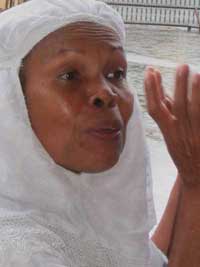 Ruaida Abrahim, 40, lives 100 meters from Oxfam’s office in the center of Banda Aceh. Together with 500 other displaced people she is living in the Parliament building. “In my village we where desperate, all of us lost our homes after the Tsunami. We didn’t know where to go. I asked some people I knew from the government if we could stay in this building and they agreed to let us stay. Since Oxfam installed a water tank, distributed mattresses, built latrines and started paying people to pick up the rubbish, our situation has improved a lot… but we need much more. . As the secretary of this community, I am keeping track of everybody’s needs and of all the organisations that want to help us, so everybody receives aid. We are very well organised, our camp is number one!.
Ruaida Abrahim, 40, lives 100 meters from Oxfam’s office in the center of Banda Aceh. Together with 500 other displaced people she is living in the Parliament building. “In my village we where desperate, all of us lost our homes after the Tsunami. We didn’t know where to go. I asked some people I knew from the government if we could stay in this building and they agreed to let us stay. Since Oxfam installed a water tank, distributed mattresses, built latrines and started paying people to pick up the rubbish, our situation has improved a lot… but we need much more. . As the secretary of this community, I am keeping track of everybody’s needs and of all the organisations that want to help us, so everybody receives aid. We are very well organised, our camp is number one!.
Credit: Lina Hoglun/Oxfam
Seuliman settlement, Aceh, Indonesia
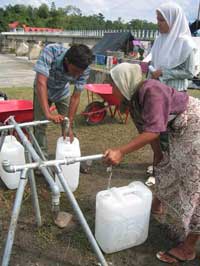 Seuliman settlement, now home to 3000 people. The settlement is located 40 minutes away from Banda Aceh. Oxfam is providing clean water to the residents and has built 40 latrines and has distributed jerry cans.
Seuliman settlement, now home to 3000 people. The settlement is located 40 minutes away from Banda Aceh. Oxfam is providing clean water to the residents and has built 40 latrines and has distributed jerry cans.
Credit: Lina Hoglun/Oxfam



